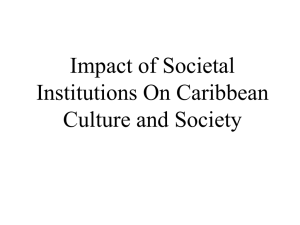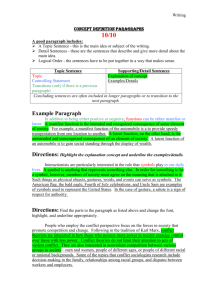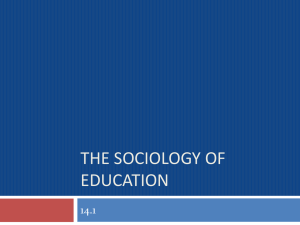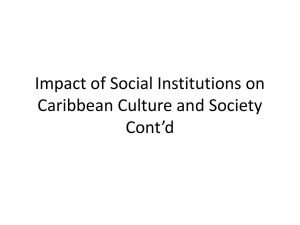Religion:
advertisement
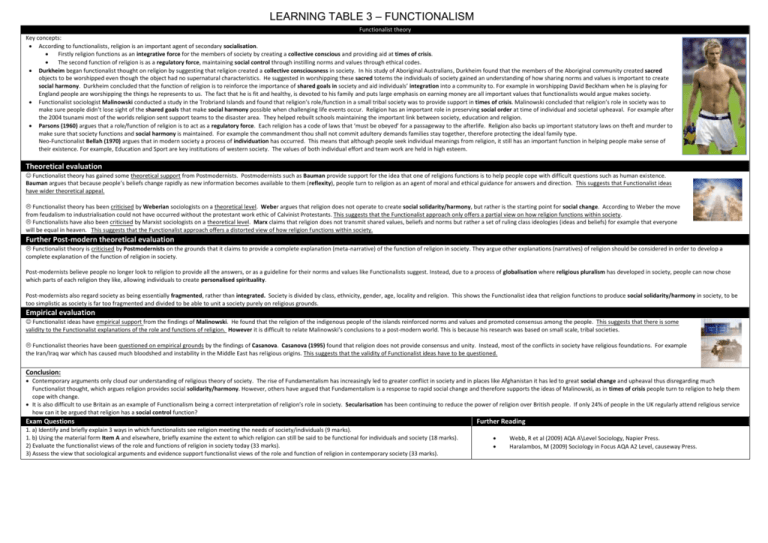
LEARNING TABLE 3 – FUNCTIONALISM Functionalist theory Key concepts: According to functionalists, religion is an important agent of secondary socialisation. Firstly religion functions as an integrative force for the members of society by creating a collective conscious and providing aid at times of crisis. The second function of religion is as a regulatory force, maintaining social control through instilling norms and values through ethical codes. Durkheim began functionalist thought on religion by suggesting that religion created a collective consciousness in society. In his study of Aboriginal Australians, Durkheim found that the members of the Aboriginal community created sacred objects to be worshipped even though the object had no supernatural characteristics. He suggested in worshipping these sacred totems the individuals of society gained an understanding of how sharing norms and values is important to create social harmony. Durkheim concluded that the function of religion is to reinforce the importance of shared goals in society and aid individuals’ integration into a community to. For example in worshipping David Beckham when he is playing for England people are worshipping the things he represents to us. The fact that he is fit and healthy, is devoted to his family and puts large emphasis on earning money are all important values that functionalists would argue makes society. Functionalist sociologist Malinowski conducted a study in the Trobriand Islands and found that religion’s role/function in a small tribal society was to provide support in times of crisis. Malinowski concluded that religion’s role in society was to make sure people didn’t lose sight of the shared goals that make social harmony possible when challenging life events occur. Religion has an important role in preserving social order at time of individual and societal upheaval. For example after the 2004 tsunami most of the worlds religion sent support teams to the disaster area. They helped rebuilt schools maintaining the important link between society, education and religion. Parsons (1960) argues that a role/function of religion is to act as a regulatory force. Each religion has a code of laws that ‘must be obeyed’ for a passageway to the afterlife. Religion also backs up important statutory laws on theft and murder to make sure that society functions and social harmony is maintained. For example the commandment thou shall not commit adultery demands families stay together, therefore protecting the ideal family type. Neo-Functionalist Bellah (1970) argues that in modern society a process of individuation has occurred. This means that although people seek individual meanings from religion, it still has an important function in helping people make sense of their existence. For example, Education and Sport are key institutions of western society. The values of both individual effort and team work are held in high esteem. Theoretical evaluation Functionalist theory has gained some theoretical support from Postmodernists. Postmodernists such as Bauman provide support for the idea that one of religions functions is to help people cope with difficult questions such as human existence. Bauman argues that because people’s beliefs change rapidly as new information becomes available to them (reflexity), people turn to religion as an agent of moral and ethical guidance for answers and direction. This suggests that Functionalist ideas have wider theoretical appeal. Functionalist theory has been criticised by Weberian sociologists on a theoretical level. Weber argues that religion does not operate to create social solidarity/harmony, but rather is the starting point for social change. According to Weber the move from feudalism to industrialisation could not have occurred without the protestant work ethic of Calvinist Protestants. This suggests that the Functionalist approach only offers a partial view on how religion functions within society. Functionalists have also been criticised by Marxist sociologists on a theoretical level. Marx claims that religion does not transmit shared values, beliefs and norms but rather a set of ruling class ideologies (ideas and beliefs) for example that everyone will be equal in heaven. This suggests that the Functionalist approach offers a distorted view of how religion functions within society. Further Post-modern theoretical evaluation Functionalist theory is criticised by Postmodernists on the grounds that it claims to provide a complete explanation (meta-narrative) of the function of religion in society. They argue other explanations (narratives) of religion should be considered in order to develop a complete explanation of the function of religion in society. Post-modernists believe people no longer look to religion to provide all the answers, or as a guideline for their norms and values like Functionalists suggest. Instead, due to a process of globalisation where religious pluralism has developed in society, people can now chose which parts of each religion they like, allowing individuals to create personalised spirituality. Post-modernists also regard society as being essentially fragmented, rather than integrated. Society is divided by class, ethnicity, gender, age, locality and religion. This shows the Functionalist idea that religion functions to produce social solidarity/harmony in society, to be too simplistic as society is far too fragmented and divided to be able to unit a society purely on religious grounds. Empirical evaluation Functionalist ideas have empirical support from the findings of Malinowski. He found that the religion of the indigenous people of the islands reinforced norms and values and promoted consensus among the people. This suggests that there is some validity to the Functionalist explanations of the role and functions of religion. However it is difficult to relate Malinowski’s conclusions to a post-modern world. This is because his research was based on small scale, tribal societies. Functionalist theories have been questioned on empirical grounds by the findings of Casanova. Casanova (1995) found that religion does not provide consensus and unity. Instead, most of the conflicts in society have religious foundations. For example the Iran/Iraq war which has caused much bloodshed and instability in the Middle East has religious origins. This suggests that the validity of Functionalist ideas have to be questioned. Conclusion: Contemporary arguments only cloud our understanding of religious theory of society. The rise of Fundamentalism has increasingly led to greater conflict in society and in places like Afghanistan it has led to great social change and upheaval thus disregarding much Functionalist thought, which argues religion provides social solidarity/harmony. However, others have argued that Fundamentalism is a response to rapid social change and therefore supports the ideas of Malinowski, as in times of crisis people turn to religion to help them cope with change. It is also difficult to use Britain as an example of Functionalism being a correct interpretation of religion’s role in society. Secularisation has been continuing to reduce the power of religion over British people. If only 24% of people in the UK regularly attend religious service how can it be argued that religion has a social control function? Exam Questions 1. a) Identify and briefly explain 3 ways in which functionalists see religion meeting the needs of society/individuals (9 marks). 1. b) Using the material form Item A and elsewhere, briefly examine the extent to which religion can still be said to be functional for individuals and society (18 marks). 2) Evaluate the functionalist views of the role and functions of religion in society today (33 marks). 3) Assess the view that sociological arguments and evidence support functionalist views of the role and function of religion in contemporary society (33 marks). Further Reading Webb, R et al (2009) AQA A\Level Sociology, Napier Press. Haralambos, M (2009) Sociology in Focus AQA A2 Level, causeway Press.
